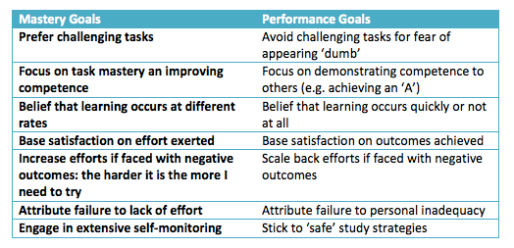The sort of goals an individual has determines why they participate in an activity. Consider two students. Alfred wants to achieve well, he studies hard and is set on getting an A in mathematics. However, he is petrified of failing to meet his goal. As a result he avoids situations that are particularly challenging, as he doesn’t want to risk appearing ‘stupid’ if he can’t complete the task. Most of the time Alfred achieves highly by academic standards. On the occasion that Alfred does not achieve an A, however, he blames himself for being ‘dumb’ and doubts he has the capacity to achieve highly in mathematics. Alfred likes to stick to the techniques he knows in order to learn: he prefers to spend his study time rote-learning and practising mathematics problems in order to increase his fluency.
Lucy enjoys the process of learning mathematics. She sees challenging situations and failure as an opportunity to learn. Lucy likes to reflect on her learning to consider what cognitive and metacognitive strategies she employed and how successful they were. She learns that some strategies aren’t always useful and didn’t result in optimal outcomes, but she considers this as part of the learning process. Lucy doesn’t always achieve As, but if she fails to meet her goals she considers the causes such as inadequate effort or a failure to understand something completely. Lucy bases academic satisfaction on the amount of effort she exerts: if she feels as though she has tried her best she is happy with her outcomes.
These two students clearly have quite different learning goals: Alfred displays a performance-goal approach to learning whilst Lucy possesses mastery goals. The table below summarises the difference between mastery (learning) and performance goals.
So what can teachers do to increase the tendency of students to be more mastery-oriented? Placing emphasis on understanding, rather than performance or outcomes achieved is the single most important factor in promoting a mastery approach to learning. When emphasis is placed on understanding over competition and ability, students tend to embrace, rather than avoid opportunities to improve their understanding. Braten and Stromso (2004) propose mastery goals promote student interest, as students’ emphasis is placed on engaging with their learning, rather than achieving a particular performance outcome. These students are more adaptive and have a greater tendency to view intelligence as malleable.
The research on learning orientations raises some significant concerns. The final year of study in Australia is clearly focused on achieving a single, ‘objective,’ measureable score. Students are highly focussed on achieving the best possible ATAR or OP possible, causing traditionally mastery-focused students to develop performance orientations. We are pushing our students to become performance oriented at the detriment of their learning experiences. When I curated EduTweetOz in January there was enormous debate concerning the need of providing students with grades: are they really necessary? What do they achieve? Is there not more valuable ways of providing students with feedback than reducing their learning efforts to a single mark?
I certainly don’t have the answers, but what I can control is this: the manner in which I interact with students on a day-to-day basis in the classroom. I can explicitly state that I want them to understand and that I’m more interested in their understanding than their academic grades. I can create environments conducive to taking safe academic risks where it’s ok to fail. I can help students understand that challenges present opportunities for learning and that it’s only through pushing ourselves we realise what we are capable of.
One of the greatest figures in the field of mindset and goal-orientations is Carol Dweck, the Lewis and Virginia Eaton Professor of Psychology at Stanford University, has researched the field of learning and goal-orientations extensively. You can visit her website and complete a quiz to determine what type of mindset you have.
Read more:
- Bråten, I. & Strømsø, H. I. (2004). Epistemological beliefs and implicit theories of intelligence as predictors of achievement goals. Contemporary Educational Psychology, 29, 371-388.
- DeBacker & Crowson, (2006). Influences on cognitive engagement: Epistemological beliefs and need for closure
- Dweck, C. S. (1986). “Motivational processes affecting learning”. American Psychologist 41 (10): 1040–1048. doi:10.1037/0003-066X.41.10.1040
- Dweck, C.S. (2007). Self-theories: The mindset of a champion. In T. Morris, P. Terry & S. Gordon (Eds). Sport and exercise psychology: International perspectives. Morgantown, WV: Fitness Information Technology.
- Dweck, C.S., & Leggett, E.L. (1988). A social-cognitive approach to motivation and personality, Psychological Review, 95, 256-273.Beswick, K. (2006). The Importance of Mathematics Teachers’ Beliefs. Australian Mathematics Teacher, 62(4), 17-21.
- Jennison, M and Beswick, K, Student Attitude, Student Understanding and Mathematics Anxiety, Shaping the future of mathematics education : proceedings of the 33rd annual conference of the Mathematics Education Research Group of Australasia, 3 – 7 July 2010, Fremantle, Western Australia, pp. 280-288. ISBN 978-1-920846-25-1 (2010) [Refereed Conference Paper]
- Pantziara, M. & Philippou, G. (2007). Students’ Motivation and Achievement and Teachers’ Practices in the Classroom. http://www.emis.de/proceedings/PME31/4/56


Pingback: NAPLAN: The Assessment that needs Assessing | matthitude